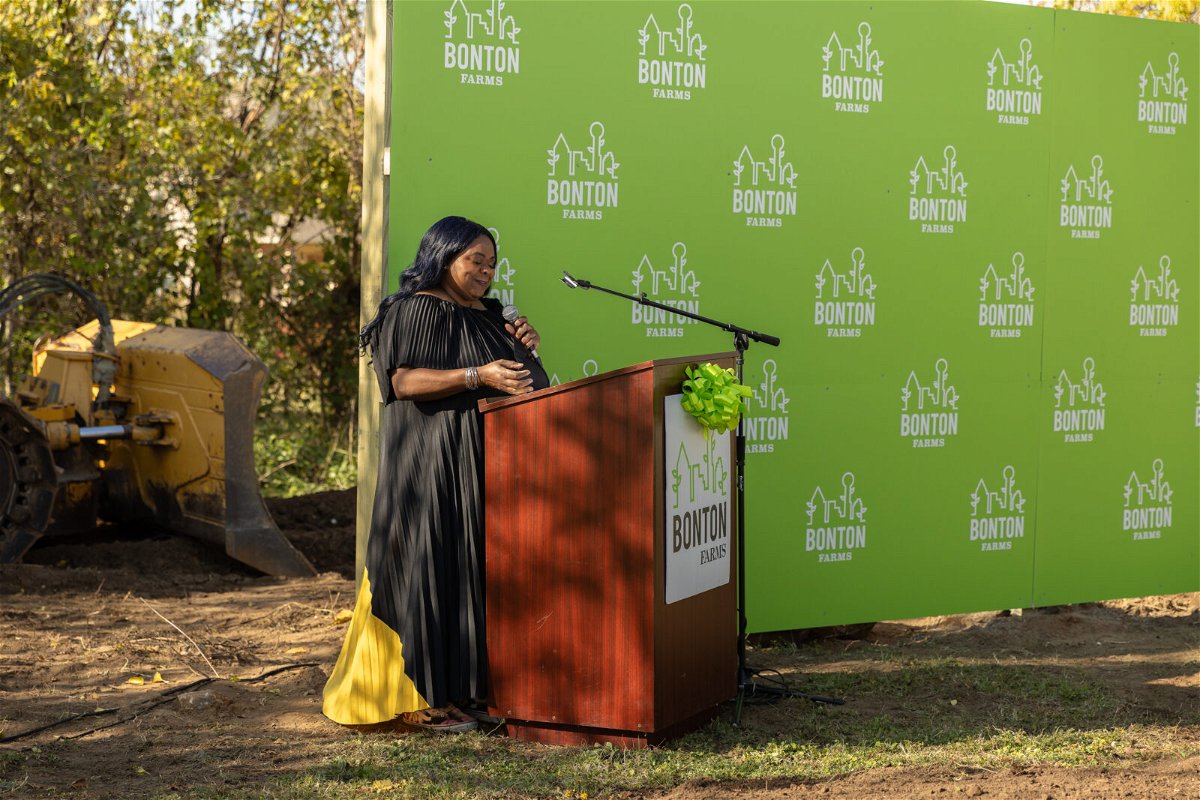Bonton resident Tashamika “Tasha” Lee is a cancer survivor.
Three years ago, in the middle of the pandemic, Lee’s cough got so bad, she says her co-workers at Bonton Farms called an ambulance to take her to the Baylor emergency room. She was diagnosed with Stage 4 non-Hodgkins-Lymphoma, a blood cancer. Doctors said she wouldn’t make it.
Lee knows it’s a miracle that she’s alive and cancer-free, but she also wonders if her treatment could have been shortened — been less taxing and less expensive — had she seen a doctor sooner. The last time she’d seen a doctor was in 2015, also because she was very sick.
“Transportation is the issue,” Lee says. Without a car, Lee says traveling to Baylor hospital on the bus takes about 45 minutes from Bonton Farms. Parkland hospital, she says, can take 1.5-2 hours.
Access to health care in communities like Bonton has been an issue for generations. Bonton Farms says that’s why they are the latest non-profit organization in Dallas to add a wellness center in their community, providing primary care services for neighborhood residents. The $5.2 million clinic is scheduled to open in 2025.
“I am overwhelmed with how the lack of access to total wellness has impacted generations of people,” Gabe Madison, Bonton Farms CEO, said at the December groundbreaking for the new clinic.

“Our neighbors are suffering from more than just food insecurity,” Madison said, referencing the nonprofit’s origin as an urban farm. “This community, you all, are in need of holistic health. We are overjoyed that this will allow the community to be transformed due to the healing that will occur.”
Community-based health care
Creating neighborhood health clinics is not a new phenomenon.
Since the late 1980s, Parkland Hospital has focused on serving medically underserved areas by doing just that. This includes Community Orientated Primary Care clinics, Youth and Family Centers and the Homeless Outreach Medical Services, or HOMES, program.
Every three years, Parkland and the Dallas County Health and Human Services Department conduct a community health needs assessment to determine where they should add more clinics.
What’s different now, says Christina Mintner, senior vice president of population health at Parkland Health and Hospital System, is that communities are now asking for health clinics in their neighborhoods.
When Jubilee Park and Community Center in East Dallas reached out to Parkland about adding a health clinic in 2018, Mintner says Parkland’s first step was conducting their own needs assessment.
“We look at data, we look at [emergency department] visits from the zip codes — if they are going to different clinics, how far they are driving, barriers to care, transportation issues, is there a DART [rail stop] in the area — there are lots of things, but mainly just looking at the data and seeing if a lot of the patients from the area are having to travel far.”
Alejandra Saldaña, the health and wellness manager at Jubilee Park, says the health clinic was entirely the community’s idea. Jubilee surveyed its own residents and found that 55% of neighbors said that transportation was their main barrier to accessing health care. In the same survey, more than 60% of residents said a clinic would be the most impactful service for improving their health and well-being.
“We knew that we needed something here to help move the needle from reactive care to more preventive care,” Saldaña says. “And, also shifting that mind set for community members too.”
Jubilee Park launched 20 years ago with an after-school program. They added the community center in 2010, and affordable housing for seniors and families by 2016. They celebrated the one year anniversary of their $7.8 million health clinic last September.
“We knew that there were disparities here, and people are living years less than folks in other zip codes,” Saldaña says. She grew up in the neighborhood and attended the after-school program at Jubilee’s community center. “What do we not have access to, that other people do, that allows us to live longer with a better quality life?”
Today, Jubilee has two full-time primary care physicians seeing patients five days a week, and a pediatrician and geriatric physician by appointment. The facility also offers dental care twice a week, and is looking to add a second dentist to provide five-day-a-week coverage. Jewish Family Service also provides mental health resources five days a week at the clinic.

Saldaña says they are in the process of looking at the health clinic’s data to see how it is impacting the Jubilee Park community. She says she’s proud that the clinic has between 250 to 400 patient visits a month.
“I’ve physically walked people to the door,” Saldaña says. “Our piece is that soft hand-off — ‘There’s doctors here in your neighborhood; you can walk here.’ We want residents to feel confident in being their own advocate.”
Saldaña says while the health clinic is just one part of Jubilee’s “holistic approach” to revitalizing the community, she’s biased in believing that it may be the cornerstone for the other focus areas of education and workforce, public safety, housing and opportunity.
Parkland’s Mintner says finding solutions to help disinvested communities are all interrelated.
“That’s why it’s important to have a collective impact approach and partner with other nonprofits and community organizations. The problem is just too big,” Mintner says. “They are an organization whose role is to revitalize the community, similar to Frazier and the work that’s being done at Redbird.”
Frazier Revitalization: Model for “holistic” community revitalization
“We definitely approached Parkland,” says Dorothy Hopkins, president and CEO of Frazier Revitalization.
Around 2007, when the nonprofit first asked neighbors in South Dallas what they wanted to see in their neighborhood, cleaning up crime and affordable housing topped the list.
So Hopkins says Frazier slowly started buying up land that she says was crime-infested “with drugs and prostitution. What we called a ‘hot sheet motel’ that was there.”
Six years later, Hopkins says they had a concept for a multi-family housing complex sketched out for the corner of Elsie Faye Heggins and HWY 352. Financing the project was a problem. So Hopkins says they reached out to Parkland to consider adding a small 8,000-square-foot health clinic.
Parkland had a better idea, Hopkins says. They wanted to move their East Dallas community-oriented primary care clinic to this site in South Dallas. Parkland’s research showed that the majority of their patients were coming from the South Dallas area, especially emergency room patients.
“We had a lot of discussions with the neighborhood,” Hopkins remembers. “First and foremost, they wanted that area cleaned up. When we brought forth this medical need, the neighborhood thought this was just perfect.”
Hopkins says they had the full support of Tru Lee Missionary Baptist Church and the Bertrand Neighborhood Association.
Parkland holds weight in the community, Hopkins says. “This is a substantial service. It’s right across from the DART station.”
The timeline was quick: The groundbreaking ceremony was May 1, 2014; financing closed on Aug. 29, 2014; The Hatcher Station Health Center opened in May 2015.
Parkland leased the building from Frazier Revitalization for the first seven years. Today, Parkland owns the 44,000-square-foot clinic that includes 66 exam rooms, waiting areas for 400 people, a pharmacy and radiology space for x-rays and scans.
Parkland says the Hatcher Health Center had more than 56,000 clinic visits per year, and that’s not including visits to the Women’s Health Center.
It’s difficult to know if the clinic has improved the overall health of the neighborhood. Hopkins says in the 2019 Dallas County Community Health Needs Assessment, “75215 was the worst zip code. In the 2022 community assessment, we weren’t the worst of the worst.”

Hopkins says what did change was the Hatcher Health Clinic “cleaned up a lot of ill. It made that whole neighborhood safer.”
Bonton Farms’ health clinic goals
It’s hard to say what Bonton residents want in their new health clinic. The nonprofit organization didn’t share any data or surveys to help us understand who wanted the health clinic and why.
Dallas’ Methodist Hospital will be providing primary medical care two days a week once the clinic is open. Methodist’s media department officials pointed to Bonton Farms’ website to explain the need for a health clinic: 63% of residents lack personal transportation and the nearest grocery store is a 3-hour round-trip bus ride away. According to the website, Bonton’s cardio-vascular disease rate is 54% higher than that of the city of Dallas. Diabetes is 45% higher. Stroke 61% higher. Cancer 58% higher.
Lee says it doesn’t take a genius to see how a health clinic will help.
“There are so many neighbors that have high blood pressure, issues with their heart, and diabetics,” the cancer survivor says. “This would impact them so greatly. “
“This breaks a generational curse and that’s what we need to do,” Lee continues. If this clinic had been around in decades past, she continues, maybe “Big Mama and Papa would still be here.”

Superb access to superb health care and nutritionous foods can make a difference as to what generations can think and do for their country.